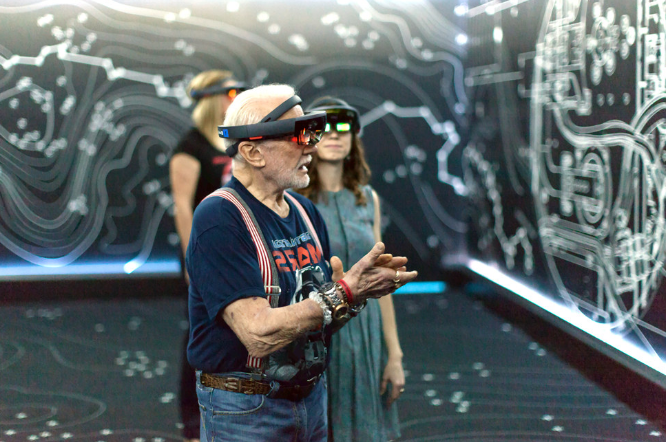Featured
Is XR the new VR?
Last year was dominated by Artificial Intelligence – and the year before by Big Data and IoT. But what about next year? How can local companies predict the next wave to ensure innovation and differentiation? One largely needs to follow the breadcrumbs of technology releases, and the ensuing innovators and influential early adopters who dictate the pace of consumption, with their followers lining up behind them.
Over the following 12 months a variety of Extended Reality (XR) products are coming to market that demonstrate a new era of human-computer interaction. Extended Reality is a broad grouping of technologies that change the way we experience digital content. This encompasses all the Virtual Reality (VR), Augmented Reality (AR) and Mixed Reality (MR) technologies, enabling profoundly engaging experiences unimaginable a few years ago. From deeply immersive design, training and entertainment applications in VR, to informative or engaging digital overlays in AR, to integrated MR content that allows for digital and real-world interactions, the new realms of XR are set to change the way we experience the world.
Releasing later this year, all signs point to The Oculus Quest being the realisation of the Virtual Reality (VR) dream: affordable, relatively powerful, untethered VR with six degrees of freedom and top tier controllers. Hot on their heels, rumour has it that Apple Glasses will launch their AR headsets in 2020 (though, as yet, unconfirmed). Adding to the competition, Microsoft plans to release their new HoloLens toward the end of the year, promising a significant upgrade on their advanced technology.
The hype built by Oculus (and others) during the launch period of version 1 VR headsets sold a vision that was far removed from the product brought to market which led to VR being perceived as an expensive and complicated device with little content. But the reality in 2019 is quite different where there is an explosion of content on affordable devices. The reason? VR has built out its benefits steadily, beyond entertainment and simulation, into life-changing advancements, becoming widely used for cognitive-based therapy (CBT) – tackling anxieties and phobias around heights, spiders, or a fear of flying, through to social anxiety or body image. Known as Virtual Reality Exposure Therapy (VRET) it allows patients to access cost-effective anxiety treatment, which can be implemented at home, and its immersive power potentially bypasses the use of medication in many cases, getting a nod too from the powers that be. The American Psychological Association (APA) outlined that VR is “particularly well suited to exposure therapy”, dispelling whatever doubt or criticisms may be looming.
That’s not all. While XR is already used in simulation (flight and military, among others), its usage is expected to dramatically increase within entertainment, museums and tourist attractions, education, and within the transformation of retail e-commerce, offering virtual shopping within various outlets.
Colin Payne, CEO of Sozo Labs, a part of the Alphawave Group, adds, “This presents global and local companies with a choice. Do they invest in the development of platforms that may be somewhat tired by 2022, or seize first-mover advantage as the innovators and owners of XR in their industry space? This next 12 months is the time to make that leap. Out of the ordinary brands really do see that, seeing the opportunity to develop and experience enhanced training or customer experience or even just generating publicity by being innovators in this new space.”
“VR will take centre stage within the next year. Affordability has improved and is pitched to be the next upgrade on social media or mobile phone gaming, arguably waning in our voracious appetite for novelty, and needing to re-invent themselves perpetually,” he says.
“Technology that was previously accessible to labs will soon be in homes and this has been worked on for years by these industry leaders. And the usage has dramatically shifted too – with price down to a few hundred dollars. Even headsets like the Samsung Gear VR that turn smartphones into virtual reality displays is already around $100.”
Sozo Labs has been engaged in the XR space for nearly three years, experimenting in each new iteration of technology. “We have applied these skills across a multitude of applications including data, property and environmental visualisation, as well as marketing experiences, game development, and education. Industry leaders ahead of the curve are already enquiring to ensure they remain the innovators in their respective field.”
Parent company CEO, Frans Meyer, concludes, “Alphawave Group has been building successful technology businesses over the past two decades, and has decided to invest in XR. Our goal is to understand the space and potential market opportunities by diving in and actually developing content and doing projects for customers. We’re convinced the market will grow and the applications will become apparent. We’re backing the team at Sozo Labs to lead this for us and look forward to seeing the growth as the real industry leaders step forward to assume first mover advantage.”
For further information visit Sozo Labs www.sozolabs.com
Share
- Click to share on Twitter (Opens in new window)
- Click to share on Facebook (Opens in new window)
- Click to share on LinkedIn (Opens in new window)
- Click to email a link to a friend (Opens in new window)
- Click to share on Reddit (Opens in new window)
- Click to share on WhatsApp (Opens in new window)
- Click to share on Pinterest (Opens in new window)
| Thank you for Signing Up |

















